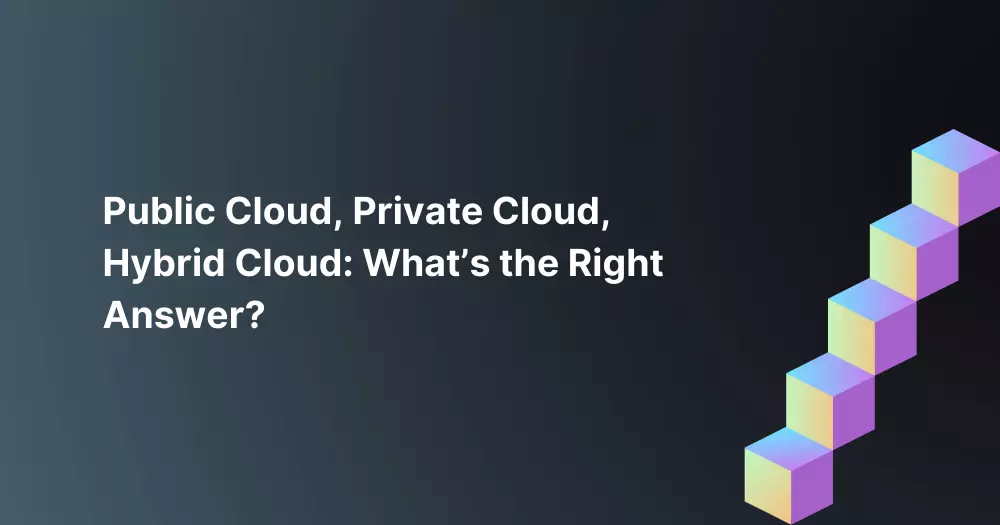
Cloud computing is not new. For years technology vendors have buzzed about the unlimited potential of moving applications to the cloud. As companies have spent more time working with cloud solutions, problems and solutions have emerged. While most businesses have adopted the public cloud for at least one of their enterprise applications or customer-facing solutions; this is really just the beginning.
Forrester Research reported in its, “Predictions 2019: Cloud Computing” that 2019 is when cloud technologies will bring innovative development services to enterprise apps rather than just serving up cheaper, temporary servers and storage.” Not surprisingly, a host of new products and cloud services have emerged to turn this forecast into reality and that means more options for companies. Today the landscape is crowded and complex!
Public cloud, private cloud, hybrid cloud, or no cloud is all architecture options. Once you narrow down the approach, there are plenty of vendors competing across these architectures for your business. In this blog, we are breaking down the different approaches to cloud and offering a high-level look at the benefits to your business.
Cloud infrastructure as a service (IaaS) or public cloud provides a standardized, highly automated solution, where compute resources, complemented by storage and networking capabilities, are hosted by a service provider and offered to the customer on demand. For businesses, this can be a considerable benefit as the resources are scalable and elastic in near real-time and generally priced by use. In the 2018 Gartner Magic Quadrant for Cloud IaaS, Amazon Web Services (AWS), Microsoft (AZURE), Google, Alibaba Cloud, Oracle, and IBM were named as the six major suppliers. All these providers generally offer a high-quality service, with excellent availability, good performance, security, and some level of customer support.
What’s the catch? The cost for these services can add up quickly if you aren’t careful. Providers typically charge every time you move data from their cloud storage to your on-premises storage. For example, if your ERP is in the cloud, there could be a lot of communication back and forth between your network and the cloud. Those “egress” fees can add up quickly!
Some organizations need greater customization or can’t risk co-locating their data in the public cloud. For those businesses, a private cloud might be a better option.
A private cloud is a form of cloud computing that is used by only one organization, ensuring that the organization’s data is completely isolated from others. It can either be physically located within an onsite data center or hosted by a third-party service provider. The hardware and software are solely dedicated to an organization, and services and infrastructure are maintained on a private network. Critical assets like data and applications are strictly controlled to ensure compliance and reduce risk.
Unfortunately, as Gartner notes, the majority of private cloud projects fail. It is no small task to build and manage cloud infrastructure. Infrastructure and operations teams have to be aligned. Business processes have to change. Not to mention, the costs can spiral out of control quickly.
As are most things in IT, when it comes to cloud, one size does not fit all. Organizations are learning that while a public cloud service might work for some applications; a private cloud might be better for others. Hybrid cloud is the approach most businesses are leaning on for cloud services. Hybrid-cloud is a model where the organization leverages both public and private clouds to host applications where they perform best.
Simply put, a hybrid cloud is a mashup of clouds. Organizations gravitate to this approach because it provides maximum flexibility. With a hybrid cloud, you can move workloads and data between private and public clouds in a flexible way as demands, needs, and costs change. Some organizations are even combining public cloud offerings.
The counterbalance to this nirvana is the management requirements. Technologies and services can be a complicated scenario that demands management bandwidth your IT organization might not have readily available.
There’s an expression that when you are a hammer, everything looks like a nail. If you are a cloud provider, you believe everyone needs a cloud. BlackPoint IT isn’t a cloud provider. We’ve been a trusted business partner to organizations across the Northwest for over 40 years. For us, when an organization is considering adopting a cloud architecture, an assessment is the first step.
It doesn’t make sense to implement a public cloud service if the application that will be hosted in the cloud will be continually communicating with the on-premise network. The egress charges in this scenario can eliminate any potential cost savings.
For businesses that want a private cloud or a hybrid cloud, we look at the complexity of the applications and the organization’s ability to manage the services. Often we learn that simplifying the management of day-to-day IT operations enables IT to focus on the business which is of considerable value.
What cloud approach is right for your business? Let’s find out, click here to request an assessment.
BlackPoint IT isn’t a cloud provider, but we do offer a cloud service for those organizations that need a little extra local support. Our service doesn’t assess egress fees and customers generally save 30-40% when compared to Microsoft Azure. Simplicity and cost savings are significant advantages, but what truly sets our team apart is our customer service. The BlackPoint team lives and works in the communities we support. Over 96% of our customers come back to us because of our service. We want to keep it that way. If you’d like to learn more, click here.